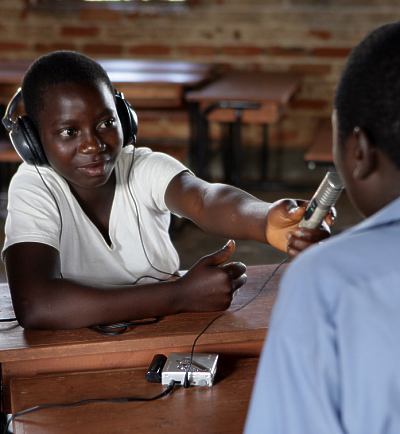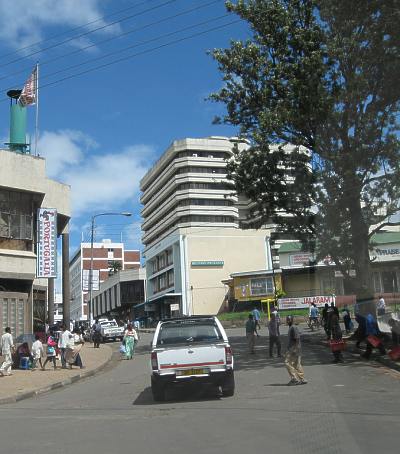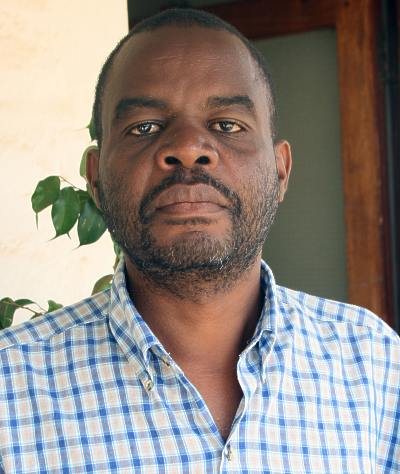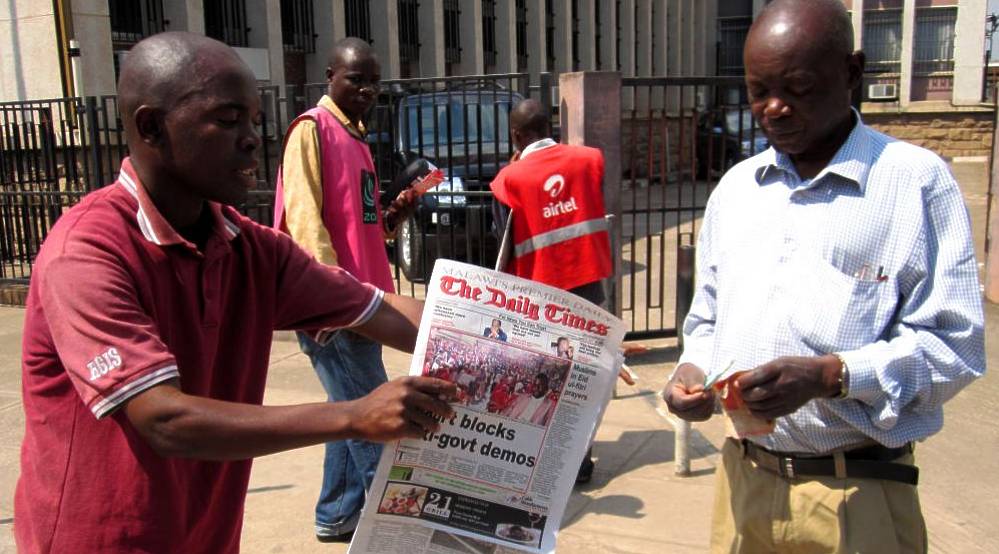Malawi |
 |
Next generation journalists: A young girl from the Timveni Child Media Radio project practises her interviewing skills |
| © Plan International Australia/afrol News |
When he first ventured into the newsroom, like many other scribes of his time, the lad who had just done his secondary school education, was only equipped with basic self-taught writing skills and a passion for journalism.
He joined the media fraternity when the country was fighting for multiparty democracy and against a thirty-year-old heavy-handed one party autocratic rule.
During this time, for the first time in Malawi, a number of media houses germinated to raise awareness and educate the masses on the merits of democratic governance in opposition to the status quo - a tough calling by then since the government in power was determined to nip in the bud any opposition to its rule.
A number of non-governmental organisations (NGOs) and trade unions also sprouted and joined the fray. Unfortunately, there was no strong collective media body to fight for the rights of journalists caught in the cross fire of the fight. The only solace journalists received was the support and goodwill of the NGO community and the public at large.
The trade union movement turned away its eye and was simply busy looking at other areas of employment than the media at a time when a journalists' pay was next to nothing and when their working conditions were harsh and simply a total slur to a person's employability and human dignity.
Traditionally, the main role of trade unions has been to safeguard the rights of workers including fighting for the improvement in their real incomes, securing their workplace tenure and ensuring their safety and healthy working environments.
To achieve these, the main mechanisms used by unions is through representation, collective bargaining in the workplace as well as lobbying that the government puts in place legislations that help workers and their families. No such organisation existed for journalists.
But now twenty years after the attainment of multi party democracy and fifty years of independence, the media landscape continue to experience threats and harassment from social, economic and political machinisation by government and "kleptocratic capitalism".
The situation has watered down the journalistic professionalism from the levels experienced at the dawn of multiparty politics. In the same vein, the passion with which the "people of the pen" carried themselves as rightly suggested by one British Parliamentarian - fourth arm of government, has weakened.
Not all is lost
Nonetheless, not all is lost, if the birth of the Journalists Union of Malawi (JUMA), a collective body of journalists formed to promote professionalism and equalise or at least reduce the lop-sidedness of power between media workers and their employers as well as to lobby for policy and legislative changes by government, is anything to go by.
The union is an attempt to engage and approach the journalist holistically as an individual, nu
 |
Downtown Blantyre, Malawi's second city |
| © Nchenga/Flickr/afrol News |
JUMA was formed to put on an equal footing the equality and fairness of both the journalists and their employers especially with the understanding that there is strength in the unity and collectivism of workers.
The major motivator of JUMA is to promote the respect of media workers rights and social and economic justice not only at the workplace but also in the broader society.
Unfortunately despite the wide range of challenges facing both the practicing and retired journalists in the media industry, the level of enthusiasm for journalists to join the union is lukewarm. This can be attributed to a number of factors, which include that the media workers are much expectant on what the union is going to do for them than what they can do to contribute to make the entity vibrant.
Another reason is that journalism in Malawi is increasingly becoming a sort of "vulnerable employment" where because of low employment opportunities in the country, journalists fear joining the union for fear of losing their jobs hence they are so desperate to keep their jobs and opt out of any fight for their rights.
This has made it difficult for the organisation to operate and to protect and improve the living conditions of journalists and their families.
"Khaki envelopes"
It is no secret that apart from selling news, media houses are now much bent on making profits through advertising space and hence are more inclined to pay more attention to the sales and marketing departments than the newsroom despite that it is the quality of news that attracts adverts.
As a result journalists are made to survive on "khaki envelopes", workshop allowances and bribes because their in-work poverty is increasingly rising while their employer is swimming in big profits.
Meanwhile, not much has been done by the government to provide legislation that is conducive to the general working environment in Malawi. Largely this is so because formal employment remains low with the large part of the population serving in survivalist employment in the informal economy.
According to studies undertaken, the informal economy accounts for more than 80 percent of total employment.
This brings in the observation that some people including capitalistic employers have tended to regard journalism as an informal employment hence they tend to look down on their workers while the government has tended to believe that markets work better in allocating resources and that market mechanisms should create better jobs and improved living conditions.
That is why the government, even competing political parties vying for political power, do not put much seriousness on what they intend to do for the fourth estate of government and all the other workers in general apart from claiming to "review the minimum wage to ensure that employees earn a decent enough livelihood, create an effective social security system for the labour
 |
The author of this feature, Charles Mkula, is General Secretary of the Journalists Union of Malawi (JUMA) |
| © George Ntonya/afrol News |
The government also says it wants to promote dialogue between employers and employees. Meanwhile in order to achieve this, the union, that is JUMA, does not only want to benefit the journalists but also to promote industrial harmony that employers require in order to thrive since it believes that when workers are satisfied with the income and working conditions and other workplace benefits labour turnover is reduced and productivity raises.
It is common knowledge that the aforesaid reasons have gone a long way to compromise the working ethics of some members of the fraternity, a situation that also threatens democracy and good governance in Malawi.
Exploitative tendencies
Journalists like our man at the bar and many others departed after a battle well fought who sacrificed their own skills, time and money to make the current "free" Malawi should not be allowed to wallow in thoughts of having fought a vain battle.
As such the union is also geared to shaping public policy and decision-making that affect the well being of its members and the public at large by minimising exploitative tendencies of employers and the society.
JUMA was formed with the main objective to improve the financial and professional position of members and their conditions of work. In pursuing this objective the union stresses collective bargaining, which complements member's interests at workplace, and individual levels.
The union intends to train its members to supervise their basic interests by influencing legislation in collaboration with the trade union movement and other actors both at local and international levels by organising meetings, trainings and seminars for shop stewards other representatives and activists for them to keep updated and networked.
In seeking economic and social interests of its members JUMA intends to bring about fairness and social justice to a society challenged by gross inequality and injustice. The union will apart from using collective bargaining, represent the interest of its members and their families in the society through advocacy, engagement and consultations with authorities.
Members will be equipped with collective bargaining skills, employment legislation and media law.
The common good requires that journalists' financial situations be improved. Once this is achieved, the country will experience better journalism and ultimately progressive development.
Membership to JUMA is derived from newspapers, radios, TV stations, magazines, and online publications.
Currently, the majority of the members are on contractual employment.
However there are growing numbers of freelance and piecework journalists and improvement of their working conditions is the union's interest.
By Charles Mkula, the General Secretary of the Journalists Union of Malawi (JUMA)i>
By Charles Mkula
© afrol News
| Tweet |
Current afrol News Top Stories
Rwanda  |
| Rwanda succeeds including citizens in formal financial sector afrol News - It is called "financial inclusion", and it is a key government policy in Rwanda. The goal is that, by 2020, 90 percent of the population is to have and actively use bank accounts. And in only four years, financial inclusion has doubled in Rwanda. |
 |
| Famine warning: "South Sudan is imploding" afrol News - The UN's humanitarian agencies now warn about a devastating famine in Sudan and especially in South Sudan, where the situation is said to be "imploding". Relief officials are appealing to donors to urgently fund life-saving activities in the two countries. |
Guinea  |
| Panic in West Africa after Ebola outbreak in Guinea afrol News - Fear is spreading all over West Africa after the health ministry in Guinea confirmed the first Ebola outbreak in this part of Africa. According to official numbers, at least 86 are infected and 59 are dead as a result of this very contagious disease. |
Ethiopia  |
| Ethiopia tightens its already strict anti-gay laws afrol News - It is already a crime being homosexual in Ethiopia, but parliament is now making sure the anti-gay laws will be applied in practical life. No pardoning of gays will be allowed in future, but activist fear this only is a signal of further repression being prepared. |
Ethiopia  |
| Ethiopia plans Africa's biggest dam afrol News / Africa Renewal - Ethiopia's ambitious plan to build a US$ 4.2 billion dam in the Benishangul-Gumuz region, 40 km from its border with Sudan, is expected to provide 6,000 megawatts of electricity, enough for its population plus some excess it can sell to neighbouring countries. |
front page
| news
| countries
| archive
| currencies
| news alerts login
| about afrol News
| contact
| advertise
| español
©
afrol News.
Reproducing or buying afrol News' articles.
You can contact us at mail@afrol.com



